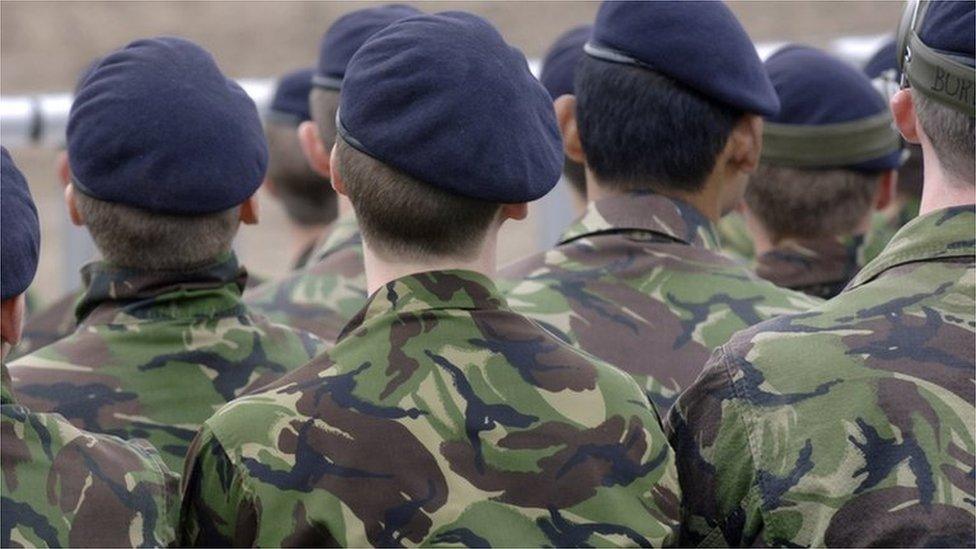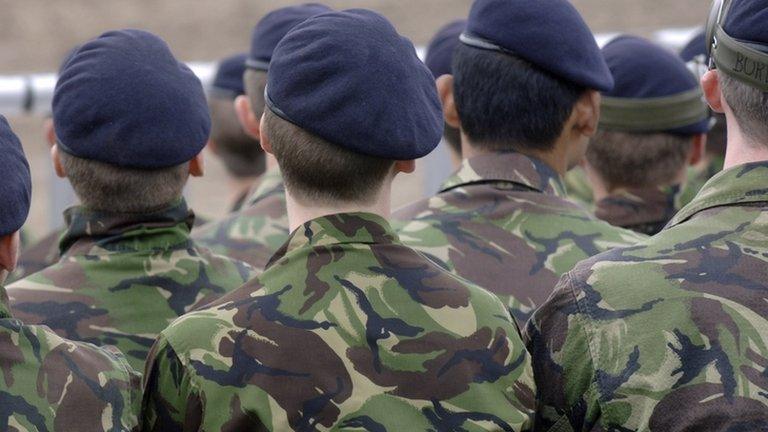Bid to raise Army recruitment age by MP Liz Saville Roberts
- Published

An MP is making a bid to raise the age of army recruitment from 16 to 18 over concerns about the long-term impact on young recruits.
Liz Saville Roberts says young recruits are more vulnerable to mental health illness, suicide and death or injury than adult recruits.
The Ministry of Defence has no plans to raise the age, arguing enlistment could be beneficial for youngsters.
The Plaid Cymru MP is due to lead a Westminster Hall debate on the topic.
She said: "The outcomes, the future that happens to the young people who are recruited into the army in the United Kingdom, they are not good prospects.
"It concerns me that this country still recruits people under the age of 18 when, in all honesty, we are the only country in the EU, in Europe, that does so."
Liz Saville Roberts says the army does not equip recruits under the age of 18 for adult life
Ms Saville Roberts, who represents Dwyfor Meirionydd, refers to a report released by the medical charity Medact which found child recruits were more prone to post-traumatic stress disorder (PTSD), alcohol abuse, self-harm, suicide, and death or injury during their career when compared to adult recruits.
The report, external also found child recruits were more likely to end up on the frontline, and that practices for recruiting children did not meet the criteria for full and informed consent.
'Greater risks'
Rhianna Louise from Forces Watch, which campaigns for raising the recruitment age limit, was involved in writing the Medact report.
She told BBC Radio Wales' Good Morning Wales: "Some people who are young recruits do enjoy their army career and it works well for them.
"But there are other people who were recruited as children who are campaigning for the recruitment age to be raised.
"Overall, people who were recruited as children face greater risks than adults.
"People talk about the army and armed forces rescuing young people who come from a certain background but, actually, if you have an experience of childhood adversity in your background, that's actually a pre-service vulnerability which means you are more likely to suffer from long-term mental health risks such as PTSD and self-harm."
'Wonderful experience'
James Wharton, 30, joined the Army as a 16-year-old following a number of years in the army cadet force in Wrexham, where he undertook Duke of Edinburgh awards and learned "self-discipline".
He said: "It took me off the streets of north Wales."
After 18 months of training in north Yorkshire, he was posted to London to carry out duties for the Royal Family.
"It was a wonderful journey and experience to go from a council estate in the north of Wales to riding a horse down the Mall next to Her Majesty the Queen.
"It's all I ever wanted to do."
Mr Wharton said his army experience had set him up for later life.
In a statement, the Ministry of Defence said: "The armed forces offer young people opportunities that aren't available elsewhere, from basic literacy education and support for postgraduate degrees, to high quality accredited training and unique employment prospects.
"Like everyone who serves our country, under 18s - who can only sign up with formal written consent of a parent or guardian - are fully supported throughout their service career."
The Parliamentary Westminster Hall debate, external is due to take place on Tuesday afternoon.
- Published8 November 2013
